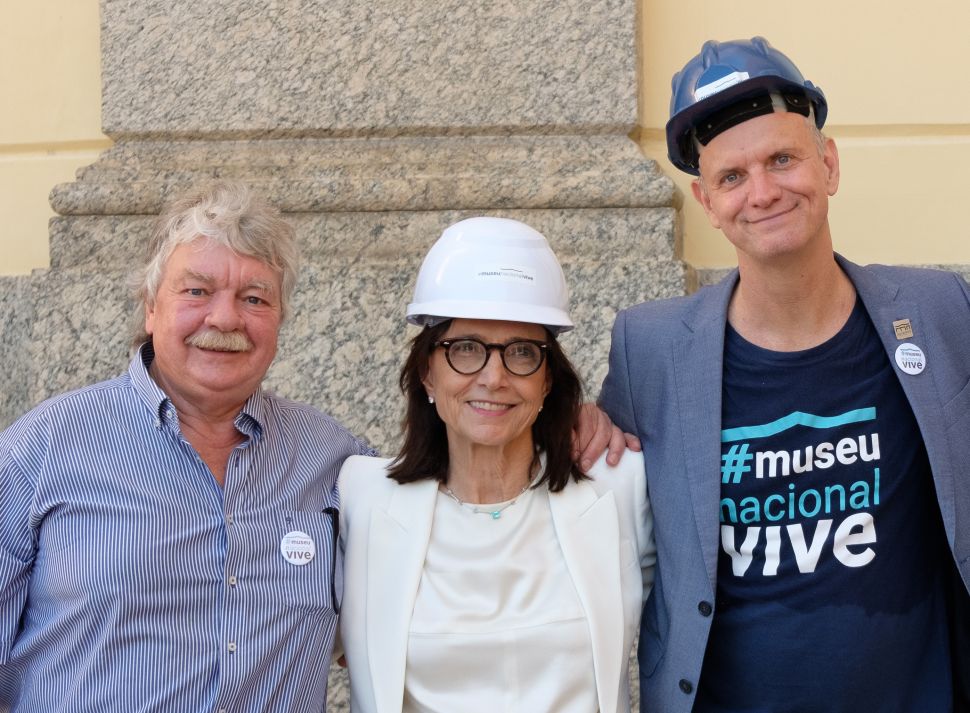
Burkhard Pohl, the Swiss-German owner of one of the world’s biggest collections of private fossils, is making a major gift to help rebuild the holdings of the National Museum of Brazil. Located in Rio de Janeiro, the 200-year-old institution lost the majority of its 20 million artifacts in a devastating 2018 fire.
In accepting Pohl’s donation of more than 1,100 fossils that include dinosaurs, turtles, plants, insects and flying reptiles, the museum is kickstarting a campaign ahead of its planned 2026 reopening to restore what was lost. The National Museum of Brazil will partner with Pohl’s fossil and gem-mining company Interprospekt Group and the arts nonprofit group Instituto Inclusaritz to rally collectors and the scientific community to help replenish its collection. “We hope this will serve as an example for others, especially individuals, to participate in the reconstruction of the main museum of natural history and anthropology in South America,” said Alexander Kellner, the museum’s director, in a statement.

Pohl comes from a long line of prominent collectors. The art holdings of his grandfather Karl Stroeher formed the basis of Frankfurt’s Museum of Modern Art, while his mother Erika Pohl-Stroeher owned Europe’s largest collection of minerals and gems. Pohl, meanwhile, has spent the past five decades amassing fossils. He’s even co-founded two museums—the Wyoming Dinosaur Center and China’s Sino-German Paleontological Museum—dedicated to the field.
A lucrative market for paleontological material
The Swiss-German entrepreneur isn’t the only prominent enthusiast of fossils, which have fetched staggering sums at auction in recent years with a tyrannosaurus rex selling for $31.8 million at Sotheby’s in 2020 and another dinosaur skeleton fetching $12.4 million in 2022. Mauricio Fernández Garza, the former mayor of Mexico’s San Pedro Garza Garcia, oversees a $120 million collection of fossils, artifacts and artwork, while German investor Christian Angermayer’s wide-ranging collection includes a tyrannosaurus rex skeleton and triceratops head.
Even celebrities like Nicholas Cage and Leonardo DiCaprio have gotten involved in fossil sales. Cage outbid DiCaprio to acquire a rare dinosaur skull for $276,000 in 2007, although the actor later agreed to return the fossil to Mongolia after discovering it had been looted.

Pohl’s gift to the National Museum of Brazil includes rare fossils like those of two dinosaurs that have never been previously described in scientific literature and two unstudied pterosaur skulls. The 1,104 fossils also include an example of the Tetrapodophis, which is possibly the earliest snake fossil.
Much of the donated collection comes from Brazil’s Araripe Basin, located between the states of Ceará, Pernambuco and Piauí. The region contains the Crato and Romualdo units, two formations that date back to 115 million and 110 million years ago respectively and are treasure troves for paleontological fossils.

The museum, which is associated with the Universidade Federal de Rio de Janeiro (UFRJ), is Brazil’s oldest scientific institution. After a fire triggered by a faulty air conditioning unit set its main building ablaze in 2018, it lost 85 percent of its entire collection and the majority of its entomology holdings and displays of Egyptian and South American mummies. While the National Museum of Brazil currently has around 2,000 objects ready for exhibition, it hopes to gather 10,000 more in the next two years, Kellner told the Guardian.
In addition to urging other collectors to contribute to rebuilding efforts, the institution’s collaboration with the Interprospekt Group will invite Brazilian researchers to participate in excavations in the U.S. In August of 2023, they hosted their first joint excavation at the Hell Creek Formation in Wyoming and Montana, inviting six Brazilian paleontologists and students in a mission that could bring North American dinosaurs to Brazil for display.
“I look forward to seeing how this collaboration enriches the museum’s offerings and inspires future generations,” said Pohl in a statement. “I hope others will join this important, collective effort to restore Brazil’s natural history collection.”
